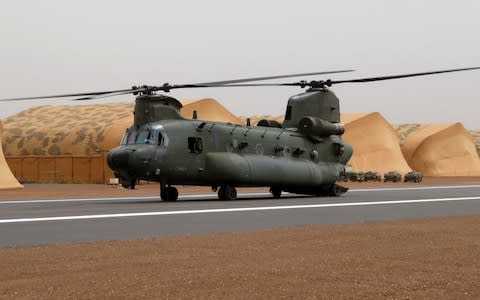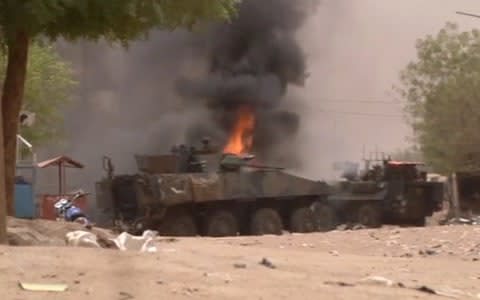Britain risks 'open ended' conflict in Mali in bid to protect European security

British helicopters have deployed to Mali in support of a French counter-terrorism operation amid warnings of being dragged into 'open-ended' conflict.
Three RAF Chinook helicopters supported by 90 military personnel have been sent to north-west Africa to assist French forces in their fight against Islamist insurgents.
The British helicopters, from RAF Odiham in Hampshire, will provide logistical and troop movement support. However, experts fear the deployment could mark the start of an open-ended commitment to a new military campaign.
The Telegraph understands the British forces have deployed to Gao, in the north of the country. The town has seen French troops targeted by insurgents in recent months and the helicopters will be used to move soldiers by air, rather than ground, where they are more vulnerable to attack.
Mark Lancaster, the Armed Forces Minister, said: “The UK and France have a unique security and defence relationship that has lasted for more than a century and this deployment demonstrates our shared commitment to tackling terrorism, instability and reducing threats to European security.”

The deployment of British forces comes days after the Defence Secretary warned that the threat from the Islamic State of Iraq and the Levant insurgent group is not fully eradicated.
Gavin Williamson said their “poisonous ideology” will cause further devastation if the momentum to destroy them in Syria and Iraq falters and they are able to inspire other such groups around the world.
It may have looked like an easy win to the politicians, but it comes with a significant amount of risk
Ewan Lawson, Rusi
France has about 4,000 troops deployed across West Africa’s Sahel region, fighting Islamist militants as part of Operation Barkhane. French forces moved into Mali in January 2013 to drive out al-Qaeda-linked militants who had attempted to take control of the country.
After initial success, a wave of attacks in recent months has seen the militants reestablish their grip over large swathes of the country. The northern half of Mali is considered largely out of government control. The Presidential election due to take place on July 29, in which the incumbent, Ibrahim Boubacar Keita, is seeking a second term, is feared to be at risk from growing insecurity.

Ewan Lawson, a senior research fellow at the Royal United Services Institute, said the UK government's support for the French operation, announced at Sandhurst in January, may have had an element of gesture politics.
"They may have thought the commitment of a few helicopters meant 'we've done our thing', without realising it was potentially putting our fingers in the mangle," he said.
"It may have looked like an easy win to the politicians, but it comes with a significant amount of risk."
France has historic ties to the region so would view any involvement there as a long-term commitment, according to Mr Lawson. He says it should not be surprising if France asked for the British helicopters, due to return in August 2019, to remain, and maybe also to be backed up by British Apache attack helicopters.

If there are British casualties, or the French lose troops defending British personnel, the pressure to stay and for the mission to be open-ended may prove politically impossible to refuse. "It is an apparently limited commitment," Mr Lawson warns, "but with a potentially large bill in the future".
The United Nations mission in Mali was established in 2013 and has more than 11,000 troops, but is considered one of the most dangerous peacekeeping operations in the world. The UN says 162 members of the mission have been killed since 2013. Some attacks are conducted by insurgents wearing UN peacekeeping uniforms.
The Armed Forces Minister told the Telegraph: “After months of planning, our helicopters are now operating with our French partners to assist Mali in countering the threats posed by terrorism and extremism and to help promote security and stability in Mali and across the Sahel region.”

 Yahoo News
Yahoo News 
